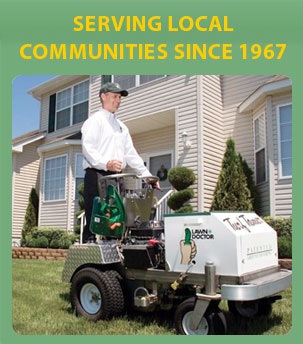This spring, diligent home owners have been reviving their once frost and snow beaten lawns back to lush green carpet teeming with life. Summer’s elongated days, increased temperatures, and rainfall, have contributed to the near perfect growing conditions in New England. Unfortunately, invasive plants or weeds, love the weather just as much as your lawn.
Though these undesirable tenants of your lawn need not be feared, they must be planned for and regularly addressed. Horticulturist Mike McDonald of Lawn Doctor of Boston, the South Shore, and Cape Cod attests, “Managing weeds is an essential part of lawn care – right up there mowing or watering.”
Generally, a healthy lawn will have a better chance at being a weed-free lawn. Adjusting simple lawn care tasks with weed prevention in mind can help to avoid an invasion before it can happen. Grass with thick high blades is best for weed prevention as well as overall health. McDonald recommends “For strong grass: mow high. Higher blade length means deeper root systems. This will keep your lawn competitive with other plants above and below ground.” Fertilizer can be added to improve thickness as well.
Keep an eye on potentially problematic patches. Areas that are walked on frequently or are near pavement and walkways often become overly compact. Often, weeds are able to triumph in compacted soil. If these weeds are further ignored, they may spread to the whole of your lawn. So use the walkway instead of the lawn and keep track of parts of your lawn that are already compact.
Bare areas must be addressed as well. The season is still early enough to add seed to bare spots. This will give them a fighting chance at competing with weeds. Continue to regularly check such patches. Weeds in these areas will cultivate easier than in the thick of your lawn. If left unattended, they may spread throughout your lawn.
The species of weeds found on lawn can bear insight on the cause for their invasion. Knotweed has wiry stems, oval green leaves and is often seen in between bricks in walkways and in cracks on the streets and sidewalks. Its’ presence often indicates a lack of water. Larger amounts of Dandelions may indicate infrequency of mowing. Dandelions that are mowed down frequently will be unable to mature there seeds and cause further infestation. McDonald cautions, “Its’ a delicate balance. Ragweed and Dandelions might mean you are not mowing enough. On the other side of the coin, if you mow too much blade length and root deepness will be reduced, weakening your lawns defense against new weeds.”
Lawn Doctor is focused on working in harmony with the science of nature. Every service is designed to boost natural growth. This goes beyond the use of simple, green products. The company’s proprietary technology allows its lawn professionals to precisely measure and apply the optimum blend of nutrients and weed control – doing the right thing for your lawn and the environment.
A healthy lawn creates oxygen, removes dust and dirt, and filters water passing through its roots leaving pollutants behind and many more benefits. Lawn Doctor of Boston, the South Shore, and Cape Cod is a local, family owned and operated business serving over 6,000 homeowners in the Greater Boston region. Main offices are located in Hanover, MA.
For more information about Lawn Doctor, visit www.LawnDoctor.com or call 800-831-1319.



Follow Us!